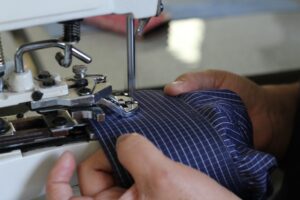In late 2019, Transparentem began its third investigation into labor abuses in Malaysia’s garment industry. In this investigation, Transparentem interviewed around 45 migrant workers from Bangladesh, Nepal, and Indonesia across three garment manufacturers. As in its earlier projects, Transparentem found that workers at the three investigated factories experienced abuses including possible debt bondage related to the payment of recruitment fees, deception in the recruitment process, and other indicators of forced labor.
In the fall of 2020, Transparentem approached ten buyers that appeared to have business relationships with the investigated suppliers to discuss the findings and encourage them to use their influence to improve workers’ lives. Of the contacted buyers, four collaborated on addressing conditions at one of the manufacturers, while one buyer apiece worked alone at the other two.
Transparentem’s engagement with those buyers resulted in varied levels of improvement. While all three suppliers instituted recruitment fee repayment plans for foreign migrant workers, no company reported a repayment plan that guaranteed complete reimbursement of all worker-borne recruitment fees and costs. One factory’s repayment plan will take three years to complete, perpetuating the risk of debt bondage. No buyer gave money to repay worker-borne recruitment fees.
In addition, two manufacturers reported progress on relieving overcrowding in worker hostels and establishing a new grievance mechanism. One of these factories also removed language restricting workers’ right to freedom of association from migrant worker contracts, and relocated workers’ passports so they could more easily access them.
Investigative Findings
Recruitment Fees Paid in Home Country and Recruitment-related Debt: All interviewed workers said they paid excessive recruitment fees and related costs. Interviewees reported paying fees to recruiters and employers of up to $5,294, the equivalent of 20 months of minimum wage pay in Malaysia in 2019. Many paid recruitment expenses in both their home country and in Malaysia. Their fees fell into three categories: fees to recruitment agents; payments for recruitment-related costs, such as medical tests; and employer-imposed wage deductions (at two of the manufacturers).
At two factories, several workers said paying high recruitment fees made them feel trapped, and that they regretted their decisions to leave their home country. One worker told an investigator, “I have to accept the hardship of this place. I have to pay off the loans. . . . Until I can [pay] it all off, I have to stick to this place.”
Deception: Many interviewed workers encountered deception in the recruitment process. Some workers said agents misled them about the total they would pay in recruitment fees. Agents deceived some workers at two factories about the nature of their work and pay. In addition, workers at all three factories said they were rushed to sign contracts they did not understand (often due to language barriers), which left them vulnerable to deception about the actual terms and conditions of their employment.
Abusive Living Conditions: Nearly all interviewed workers resided in company-provided hostels that some said were overcrowded. In the context of the COVID-19 pandemic, hostel overcrowding poses a severe risk to workers’ health.
Lack of Effective Grievance Mechanisms: Workers at two manufacturers said they had no viable channels to lodge complaints anonymously. Workers at the third factory said management failed to correct poor living conditions following worker complaints.
Other Abuses Documented at Certain Factories: Transparentem’s investigation documented evidence of other labor abuses at one or two of the three investigated factories, including passport retention, financial penalties for resigning, abusive working conditions, discipline by fines, wage withholding, restrictions on freedom of association, and compulsory overtime.
Factory & Buyer Responses
In response to Transparentem’s outreach, eight of the ten contacted buyers met with Transparentem to discuss the investigation’s findings. Six buyers then worked directly with their suppliers to address conditions for workers, to varying degrees of effectiveness. Beyond the initial meetings, Transparentem remained in touch with each of the engaged buyers, providing feedback on remediation. Prior to publicly disclosing its investigation, Transparentem contacted the three suppliers for comment.
The six engaged buyers reported that repayment programs for workers’ recruitment fees had been established at all three suppliers. Across the three suppliers, companies reported repayment plans that would ultimately provide partial financial remedy to 800 workers, via reimbursements totaling nearly $700,000. Two of the manufacturers had begun their repayment programs prior to Transparentem’s outreach. All three suppliers told Transparentem that pressure from buyers, or evolving standards within the industry, had provoked the establishment of these programs.
One buyer told Transparentem that it pushed for faster repayment at one of the factories. That manufacturer then reported back to the buyer that it had indeed accelerated payments and completed them by July 2021. The repayment plan at another factory was set to conclude at the end of 2021. This plan incorporated additional recruitment costs borne by workers beyond their fees, at the urging of the factory’s buyers. At the third factory, repayments were slated to continue through the summer of 2024, thus perpetuating the risk of debt bondage over a prolonged period.
No buyer helped finance these schemes. Ultimately, buyers fell short of Transparentem’s recommendation to both suppliers and buyers to fully repay workers for their recruitment fees.
In addition to the repayment plans, companies reported progress on relieving hostel overcrowding and establishing new grievance mechanisms at two of the factories. One of these manufacturers also reported requiring improvements to fire safety in the dormitories, migrant workers’ freedom of association, and oversight of recruitment agents’ ethical compliance.
This same supplier improved workers’ access to passports by moving their storage from the factory into workers’ living quarters, where they could access them freely, without supervision. A different supplier concluded, following an assessment, that the placement of workers’ passports near a guard station in the factory was acceptable. However, in April 2021, all interviewed workers at that supplier continued to report barriers to accessing their passports. Lack of corrective action at the factory could increase the risk that workers are restricted from exercising their freedom of movement.
Conclusion
Companies responding to Transparentem’s investigation helped ensure that vulnerable migrant workers received partial reimbursements for their recruitment fees. But without full repayment of these costs, many workers still labor under the burden of debt.
Transparentem also identified other areas where buyers and suppliers should continue to make improvements. To avoid forced labor risks, the companies engaged on this project—and other companies sourcing from factories that rely on migrant labor—should fully commit to the principle that no worker should pay for their job. In addition, buyers should support worker-representative and worker-led structures for workplace improvement and publicize and implement high standards of ethical recruitment. By forging long-term partnerships with top-performing suppliers that share these standards, buyers can also ensure the best possible working conditions for their suppliers’ employees.
Buyers and suppliers should not act alone. Investors, banks, and other financial institutions should leverage their relationships with buyers and suppliers to incentivize and support ethical recruitment priorities and require regular reporting from companies on their progress towards implementing these standards.
Advocacy, civil society, and nongovernmental organizations should likewise use their platforms to amplify positive examples of company progress, while informing the public when companies fail to protect workers.
Sustained effort and collaboration between buyers, suppliers, investors, civil society, and government can safeguard the lives and rights of migrant workers in Malaysia. Apparel companies taking a stand against any indicators of forced labor in their supply chains can demonstrate what principled leadership looks like, as part of an ongoing trend toward ethical recruitment in Malaysia, and in the apparel industry as a whole.
For more information about this project, please contact info@transparentem.org.
Photo Credit: pdrhenrique / pixabay





